9 Exercises for Upper-Body Strength as You Age’ When it comes to the effects of aging, loss of strength is among the most difficult and potentially dangerous things that occur. Additionally, age-related loss of strength typically kicks in much sooner than many other issues associated with the aging process. In fact, once people hit their mid-30s and 40s, age-related muscle and strength loss can quickly snowball into injuries and quality of life decreasing. The good news is that age-related strength losses can be delayed, offset, and even reversed by following just the right fitness and lifestyle habits. That’s where these exercises for upper-body strength as you age come in clutch.
9 Exercises for Upper-Body Strength as You Age
In general, lifting weights has one of the bigger impacts on reducing the negative impacts of aging. In my time training various clients, I’ve seen individuals in their 40s and 50s make substantial improvements to their starting strength—in some cases, becoming stronger than they were in their 30s and even 20s.
Upper-body and lower-body strength are both key factors to address. In this article, you’ll learn the best exercises for upper-body strength as you age. This particular workout hits the major muscles in your upper body and also helps maintain the range of motion during overhead movements, such as reaching for the top of a cabinet or shutting the trunk of your car.
Keep reading to learn about the nine best exercises for upper-body strength as you age, and next, be sure to check out 7 Floor Exercises That Drastically Change Your Body Shape After 40.
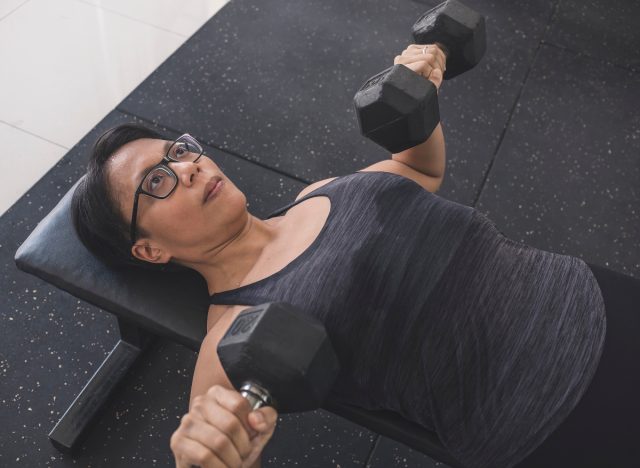
Dumbbell chest presses hit your pecs, shoulders, and triceps using a smooth and comfortable range of motion that is forgiving on the shoulders compared to barbell benching.
To perform a dumbbell chest press, lie on a flat bench with a dumbbell in each hand, palms facing forward. Position the dumbbells at chest level with your elbows bent to a roughly 90-degree angle or lower. Using a full range of motion is key. Press the dumbbells upward until your arms are fully extended. Slowly lower the dumbbells back to the starting position. Repeat for target repetitions.
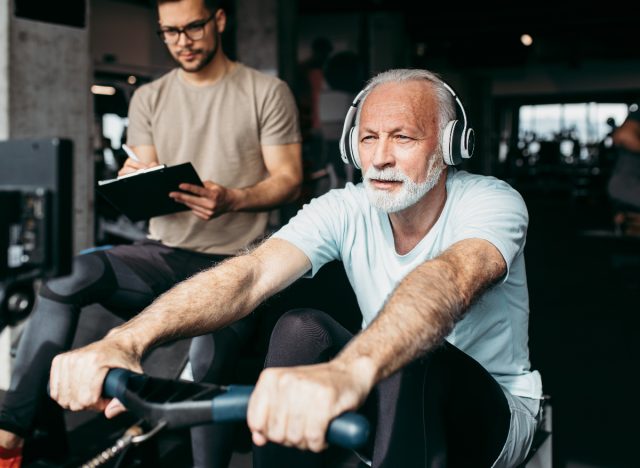
Seated rows are a great way to train your mid-back and bicep muscles with a low-risk, high-reward activity. If you struggle with various injury histories or other musculoskeletal issues, the seated row is a good alternative to barbell and dumbbell rows, although both are options as well.
To perform a seated row, sit on a bench or the floor with a cable machine set up with a horizontal pull angle relative to the floor and a parallel handle attachment. Extend your legs in front of you, and place your feet on the footrests for stability. Bend your elbows, and pull the handle towards your abdomen, squeezing your shoulder blades together and slightly downward. Do not shrug during the motion. Slowly extend your arms back to the starting position. Repeat for target repetitions.
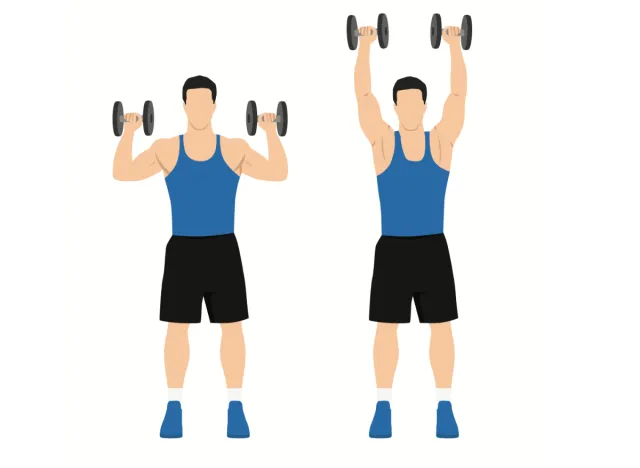
Next up in our exercises for upper-body strength as you age is the shoulder press. This move is a must when it comes to retaining your ability to reach for objects in high places or place things back up on a shelf. Dumbbell shoulder presses are some of the more forgiving options when it comes to overhead pressing, but they retain virtually all the benefits of a tool such as a barbell while adding more stabilization demands than using a shoulder press machine.
To perform a dumbbell shoulder press, stand with your feet shoulder-width distance apart, holding a dumbbell in each hand at shoulder level. Press the dumbbells overhead until your arms are fully extended. Slowly lower the dumbbells back to the starting position. Keep your core engaged, and maintain a neutral spine throughout the movement. Be sure to select a weight that allows you to press all the way up without shrugging. Repeat for target repetitions.
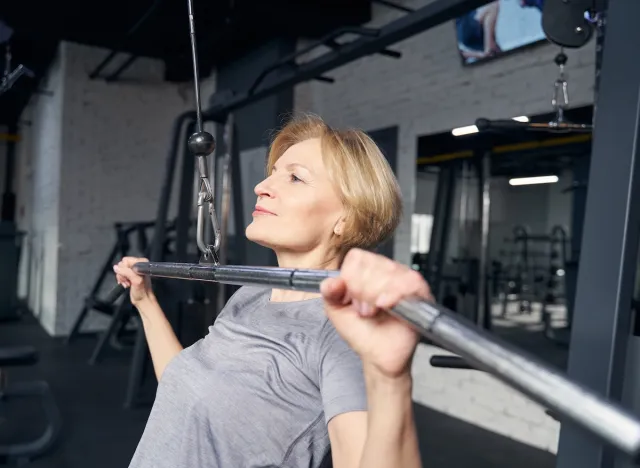
Training the pulldown motion is vital to maintaining a strong upper body. Pulldowns primarily target the latissimus dorsi, which play a major role in spinal stabilization. While pull-ups are a great option, they can be too challenging for many older individuals, so the lat pulldown machine is a great alternative.
To perform a lat pulldown, sit at a lat pulldown machine with your knees positioned under the pads. Grasp the bar with an overhand grip, wider than shoulder-width apart. Pull the bar down to your upper chest, squeezing your shoulder blades together. Slowly return the bar to the starting position. Repeat for target repetitions.
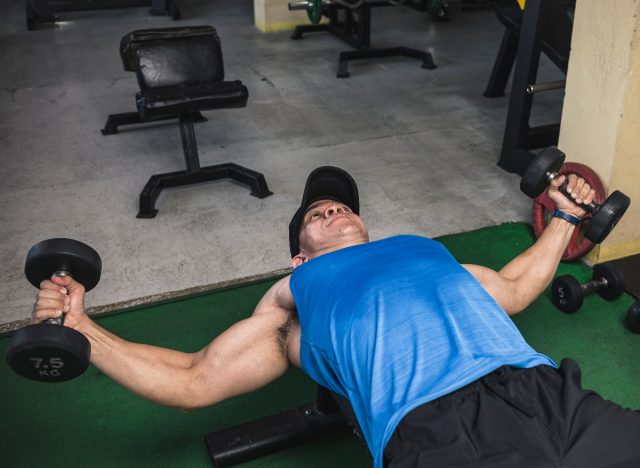
Often considered a “bodybuilding” exercise, dumbbell pec flies can be very effective for maintaining mobility in your chest while also strengthening your pectoral muscles.
To perform a dumbbell fly, lie on a flat bench with a dumbbell in each hand, arms extended above your chest. Lower the dumbbells to your sides in a wide arc while keeping a slight bend in your elbows. Aim to feel a stretch in your chest before reversing the position. Raise the dumbbells back to the starting position. Keep your core engaged, and maintain a neutral spine throughout the movement. Repeat for the target repetitions.
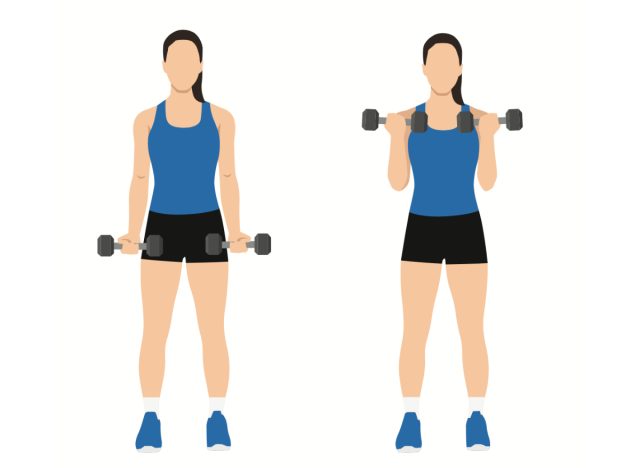
Your biceps are key muscles in your arms that help stabilize your elbows and wrists, while also contributing to the classic “buff arms” look. Go slow on the lowering phase to maximize the gains.
To perform dumbbell bicep curls, stand with your feet shoulder-width distance apart, holding a dumbbell in each hand with palms facing up, thumbs pointing outward (supine grip). Bend your elbows, and curl the dumbbells toward your shoulders. Slowly lower the dumbbells back to the starting position, keeping your elbows close to your body throughout the movement. Repeat for the target repetitions.
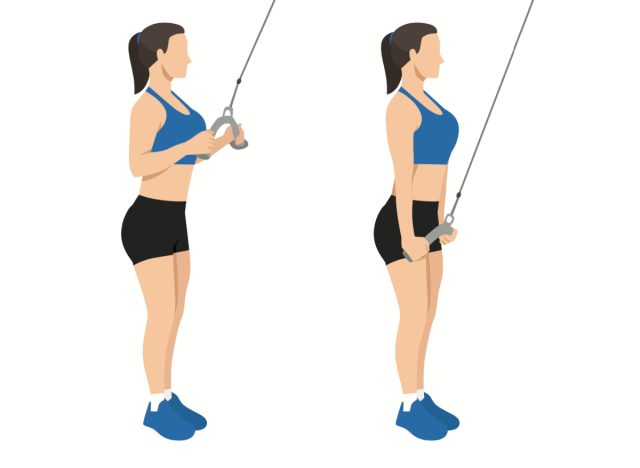
The triceps are the muscles on the back of your arms that oppose the biceps. They are also key for elbow stability as well as shoulder stability and overhead reaching. Triceps rope extensions are a safe and effective way to hit these muscles using a cable machine.
To perform triceps extensions, stand with your feet shoulder-width distance apart in front of a cable machine with a rope attachment suspended from the top. Grasp the rope with each hand. Extend your arms downward, and squeeze your triceps. At the bottom of the motion, split the rope apart for an extra squeeze. Reverse the motion, controlling the speed throughout. Keep your elbows close to your sides throughout the movement. Repeat for target repetitions.
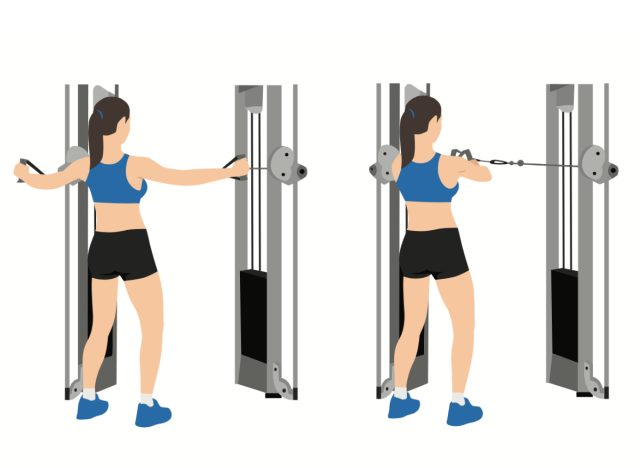
It’s vital not to neglect the posterior shoulder when it comes to a strong upper body. Some prefer using cable machines to perform reverse flies, also called rear delt rows, to target this area.
To perform a reverse cable fly, stand facing a cable machine with the cables set at shoulder height, holding the left handle with your right hand and the right handle with your left hand and crossing your arms in front of you. With a slight bend in your elbows, pull the handles out to your sides, maintaining the crossover, until your arms are in line with your shoulders. Keep the bend in your elbow fixed throughout. Slowly return your arms to the starting position, maintaining control of the cables. Repeat for the target repetitions.
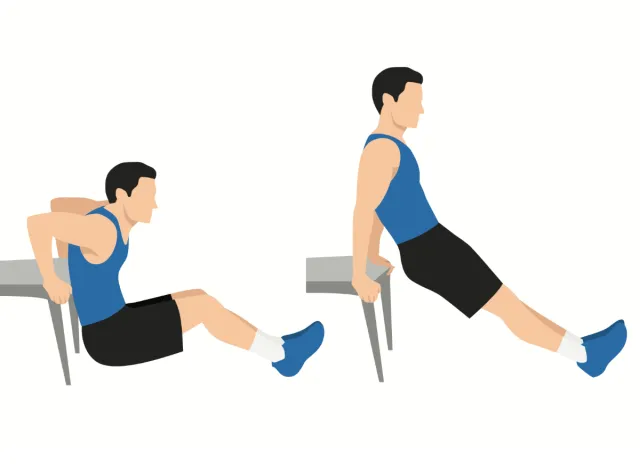
Tricep dips wrap up our top-recommended exercises for upper-body strength as you age. This exercise is great for hitting the chest, shoulders, and triceps in a downward pressing motion. You’ll boost your mobility as well as strength. You can use a machine if available, or a bench. Parallel dip bars and rings are also an option if you have the strength to do so.
To perform tricep dips, sit on the edge of a bench or chair with your hands placed beside your hips, fingers pointing forward or to the sides. Move your hips off the bench, keeping your legs bent at a 90-degree angle. Lower your body by bending your elbows until your upper arms are parallel to the floor, bringing your hips toward the ground. Once you feel a stretch at the end range of motion, push through your hands to bring your body back up to the starting position. Repeat for the target repetitions.

